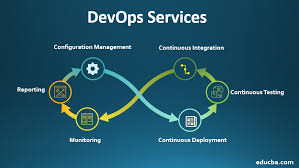Continuous Integration/Continuous Deployment (CI/CD): Automating the deployment process to improve efficiency and reliability.
Infrastructure Management: Managing and optimizing server infrastructure and resources.

DevOps Services
Automates the integration of code changes and deployment to production, ensuring that updates can be delivered quickly and reliably.
Uses code to manage and provision infrastructure, allowing for more consistent and scalable environments through tools like Terraform or AWS CloudFormation.
Implements tools and practices for real-time monitoring of applications and infrastructure, enabling proactive issue detection and performance optimization (e.g., using Prometheus, Grafana, or ELK stack).
Manages system configurations using tools like Ansible, Puppet, or Chef to ensure consistency and reduce errors across environments.
Uses containers (e.g., Docker) to package applications and orchestrators (e.g., Kubernetes) to manage container deployment, scaling, and management.
Integrates automated testing into the development pipeline to catch bugs early, improve quality, and streamline the release process.
Implements tools (like Slack, Jira, or Trello) to enhance communication and collaboration between teams, fostering a culture of shared responsibility.
Manages and optimizes cloud resources, providing services for deployment, scaling, and maintenance of applications in cloud environments.
Integrates security practices into the DevOps process, ensuring that security checks and measures are part of the development pipeline.
Establishes strategies and tools for data backup and recovery to ensure business continuity in case of failures.
